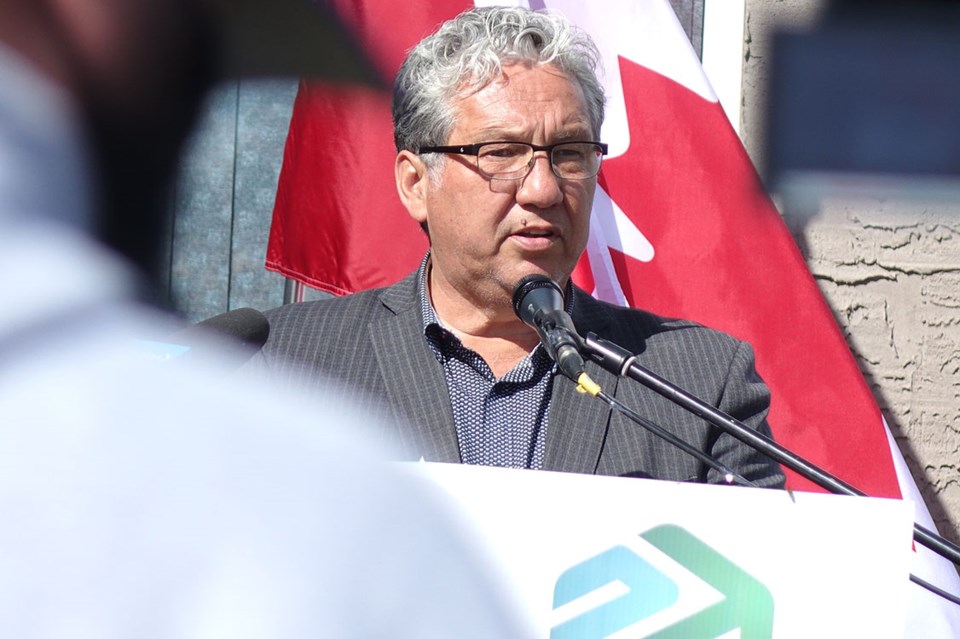Expanding economic development services into seven Prairie province communities will help stimulate regional economies and job growth where it is needed, Canada’s Northern Affairs Minister Dan Vandal said during a visit to Thompson Aug. 4.
Vandal, MP for the St. Vital riding in Winnipeg, travelled north to open a new PrairiesCan service centre in Thompson, the first of seven additional offices the agency intends to estblish
PrairiesCan is part of what used to be Western Economic Diversification, which has now been split into two entities, one for Alberta, Saskatchewan and Manitoba and another for British Columbia.
“By splitting it up, we put more focus on the Prairies and the unique challenges our Prairie provinces face,” Vandal told the Thompson Citizen in an Aug. 4 interview. “The reason behind the new offices is simply to put more focus on outreach, to try to talk to more people who may need some of the services that PrairiesCan has to offer. We need to put more focus on job creation and workforce development so we’re looking to do more strategic focus outreach in regions that could use the jobs, the economic growth.”
Thompson, Vandal says, was chosen because of its importance to the Northern Manitoba economy.
“It’s a hub,” said the minister. “Lots of people fly or travel in or out of Thompson to work There’s opportunity here, I know, certainly in mining. The rail line goes through here all the way up to Churchill.”
The Thompson PrairiesCan office is located in the Communities Economic Development Fund building, facilitating co-operative efforts by the federal and regional economic development agencies.
“We’re always looking to create partnerships with the provinces all over the west … to make sure that we can align our activities and try to work together to create more jobs,” Vandal said. “We’re hoping to do some great work up here in the North.”
During the official opening of the new office, the minister highlighted over $2 million worth of projects that PrairiesCan has funded in Northern Manitoba, including money to support the winter weather testing industry in Thompson.
“As we roll out a clean economy that focuses more on batteries, they need to be able to perform in extreme cold weather and that’s what Thompson has,” said Vandal, referencing the rising importance of electric vehicles and the nickel and lithium-dependent batteries that power them.
PrairiesCan is also funding the creation of outdoor Indigenous gathering spaces at University College of the North campuses in Thompson and The Pas.
“Young Indigenous people are our fastest-growing demographic in Manitoba and Northern Manitoba,” said Vandal. “The key to have a better future is education and we need to do all things necessary to Indigenize our institutions both at the university level and at the high school and junior high school level.”
The minister had a busy schedule during his six or so hours in Thompson on Aug. 4. Following the PrairiesCan announcement, he was due to have lunch with Thompson Mayor Colleen Smook, attend a roundtable discussion and then visit UCN. His visit came a day after the federal and provincial governments announced that they would be investing up to $147 million in Northern Manitoba’s Hudson Bay railway between The Pas and Churchill over the next two years.
“We view it as a national asset and we are going to invest in it,” said Vandal. “It’s great that the province of Manitoba has shown an interest in that as well.”
Though recent global events, such as Russia’s invasion of Ukraine, and the spectre of changes brought about by global warming have highlighted the importance of food supples and the transportation networks required to take them from where they are produced to where they are processed and consumed, Vandal says the Hudson Bay Railway was always important and that having it owned by First Nations and communities within the region it serves is better than the situation for much of the past 25 years, when it was owned by American corporation OmniTrax.
“These people live in the community and they care about what’s going on and they’re going to take care of the assets,” he said. “People rely on the railway for their services, for food. Food security is a very real issue in the north and the communities along the rail line needed medical supplies, needed to get nutrition.”



